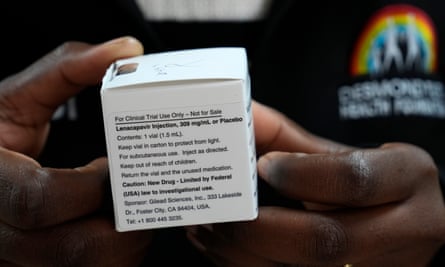When the doctor behind the trial of a new HIV prevention drug heard the results, she could not contain her emotions. “I literally burst into tears,” said Prof Linda-Gail Bekker.
“I’m 62, I’ve lived through this epidemic … I had family members who died of HIV, as did many, many Africans – many people around the world,” she said.
The problem of how to prevent HIV infection, particularly in teenage girls and young women, had seemed “intractable”, Bekker said. But lenacapavir had offered thousands of women aged 16 to 25 in South Africa and Uganda 100% protection.
The drug could give young women greater agency over their lives and sexuality, she hopes, and potentially eliminate mother-to-child transmission of the virus.
The results of the Purpose 1 trial prompted a standing ovation for Bekker, chief executive at the Desmond Tutu Health Foundation, when she presented them at the Aids 2024 conference in Munich this week.
“Even now, when I look at that [results] graph, I get shivers,” Bekker said.
Aids first emerged in 1981 as a terrifying mystery disease that was then in effect a death sentence. It took until 1983 before scientists identified that the HIV virus was behind it, and another two years before the first test was developed to detect the virus.
There has been huge scientific progress in recent years, and antiretroviral drugs mean people living with HIV can have healthy lives. Pre-exposure prophylaxis (PrEP) drugs can protect against infection.
But they are not reaching everyone who needs them and while most new infections now occur outside sub-Saharan Africa, the UN says HIV incidence among teenagers and young women remains “extraordinarily high” in parts of the region, with more than 150,000 infected there last year.
In a comparison part of Bekker’s trial, women were asked to take daily pills as PrEP against HIV. They continued to become infected – because, Bekker explains, many of them did not in fact take the pills daily.
It illustrates why the results for a drug that only needs to be injected twice a year have generated such excitement. Leaders in the field of HIV prevention describe the drug as a “miracle” with the potential to be a “gamechanger”.
“We know that adherence to anything is more challenging for younger people – and that’s because they’re busy, their lives are full, they have things to do, places to be,” Bekker said.

“One of my investigators puts it beautifully: it’s a daily decision that you have to make, ‘I’m going to take this pill and protect myself.’
“Whereas if you take a six-monthly injection, you only have to make this decision twice a year.”
Bekker hopes lenacapavir will give girls and young women who are at risk of HIV infection greater control over their own lives.
“You could imagine you could quietly slip in,” she said, “under the guise of getting your contraceptive; nobody even needs to know.”
Young women may find themselves in relationships “where they don’t have much say in how they have sex”, often with older men, where a power imbalance may make it impossible to ask their partner to use a condom, she said.
“I’ve heard young women say ‘this has given me incredible control of my own sexual identity. I now decide what happens to my body.’”
In a policy that remains relatively rare for drug trials, becoming pregnant did not exclude women, and 193 became pregnant while on lenacapavir. There are so far no signs of drug-related problems.
Bekker and her team will follow the mothers and babies for longer to confirm that the drug can prevent mother-to-child transmission during pregnancy and childbirth, and while breastfeeding. A tenth of new HIV infections come via this route.
Offering women with a newborn child an injection as she leaves hospital is likely to have far greater impact than expecting her to remember a daily pill, Bekker said, and raises the “exciting” prospect of eliminating mother-to-child transmission.
Questions remain, however, with major concerns about how quickly and cheaply the drug will reach the market. The pharmaceutical company behind the drug, Gilead, is waiting for the results of further trials in other groups before seeking regulatory approval.
At a briefing for journalists in Munich, Jared Baeten, vice-president for clinical development at Gilead Science, promised the company would work with manufacturers to ensure generic versions received regulatory approval.
But he would not confirm that middle-income countries such as Brazil would have the opportunity to get cheaper, generic forms of the drug. Gilead has also resisted calls to work with the UN-backed Medicines Patent Pool to widen access.
Trial participants will continue getting lenacapavir, and those in the comparison part of the study using pills also have the chance to switch to the injectable.
Bekker said she would “hold Gilead to account” if the company did not follow through on pledges to allow global access, but added that she had no reason to doubt their commitment.
“I’m not the clinical drug trialist who does the trial and walks away,” she said. “The impact will not be felt – it doesn’t matter how good the efficacy is – if we don’t have access.”
Source: theguardian.com


